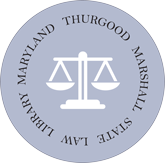Purpose
These guidelines define the optimum level of information assistance and access to legal materials that may be provided by library reference staff to non-lawyer users of the Thurgood Marshall State Law Library. These guidelines are not intended to provide staff with an excuse not to provide assistance. It must be kept in mind, however, that legal and ethical codes prohibit librarians from giving legal advice or opinion, or interpretation of primary sources of legal authority. Therefore, due care and good common sense must be used when providing meaningful information assistance to the public.
General
The law library staff will provide information and access to materials in the collection to non-lawyer patrons to the fullest extent possible, using good judgment in deciding the amount of time and effort that can be devoted to any one patron.
Staff should first advise non-lawyer patrons that ethical and legal guidelines preclude them from interpreting the meaning of sources of legal authority or ascertaining their relevance for the patron's particular need. Also, staff should not perform legal research nor offer legal advice to this user group.
Staff should attempt to identify the relevant issues involved in a reference inquiry without being drawn into the patron's specific problem(s).
Staff should never give a patron the impression, in a reference situation, that "this is the law", without qualifying the authoritativeness of the answer.
Reference Assistance: In-Person and By Phone
Staff will give preference to patrons in the library over telephone inquiries.
Typical services extended to non-lawyer patrons in the library may include, but not be limited to:
- assistance in the location and mechanical use of various sources of legal authority,
- finding aids and form books,
- the development of an up-to-date self-help collection housed in a highly visible area of the library,
- providing alternative sources of information not necessarily found in the library, such as referrals to Legal Aid, pro bono programs or government agencies specializing in different topical areas of the law (avoid "blind" referrals/suggest that patron gets back to the library if not successful with referral),
- the preparation of timely legal pathfinders and bibliographies that may further assist the non-lawyer's pursuit of legal information.
Telephone reference should be handled with a high degree of sensitivity to the increased chances of miscommunication, or misunderstanding or neglecting, on the part of the patron or staff, to provide a pertinent piece of information.
- staff, when able, will provide answers to specific questions over the phone. Caution and increased use of qualifying statements are appropriate,
- an excessive amount of staff time should not be substituted for research that should be conducted by the phone patron. The caller, when appropriate, should be encouraged to come to the Library or a more convenient public law library to conduct research,
- telephone answers should be provided from written sources only and those sources should be identified for the patron. To reiterate, no interpretation or application of this written information can be offered by the staff to the patron's particular case or set of facts,
- when time is a consideration, secure patron's name and phone number and advise patron the time frame within which staff (give your name to caller) will call back with information.
Definitions:
Access: Arranging, collecting, and providing resources and workspace where information may be sought.
Information Service: Includes direct personal assistance, directories, or signs, exchange of information pulled from a reference source, dissemination of information in anticipation of user needs, use of information referral resources, and direct end-user access to an information system via telecommunications hardware and software.
Interpretation: Explaining, clarifying, or translating a piece of information that is unclear to the person asking the question.
Legal Advice: Giving legal counsel or recommendations.
Legal Research: A study of the legal authorities, whether case or text, for the purpose of supporting a proposition.
This policy approved by the Library Committee 5/6/1991.

